Diagnosing DOCTOR WHO Series 11
Taking the temperature of a most divisive year for the long-running sci-fi drama.
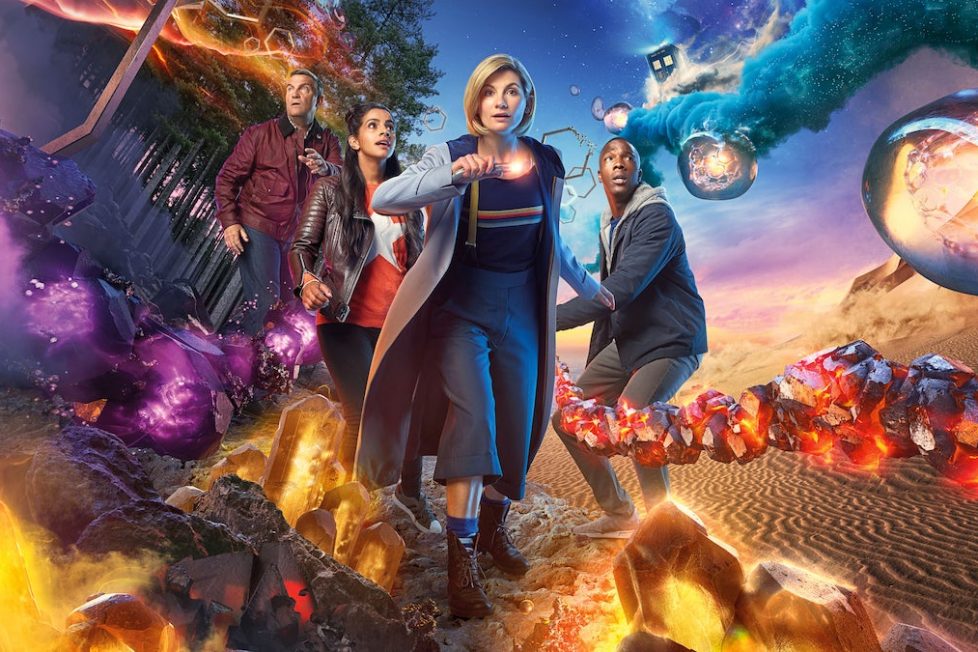
Taking the temperature of a most divisive year for the long-running sci-fi drama.


Regenerations are integral to Doctor Who’s durability, but some are more revolutionary than others. Series 11 was arguably the biggest change the show’s undergone since its return in 2005 with Russell T. Davies in charge. There was perhaps a feeling within the BBC that the series had to be rejuvenated to lure back casual audiences, as Peter Capaldi hadn’t been as widely embraced as his immediate predecessors, despite becoming the most nuanced incarnation of The Doctor in the modern era.
Himself a lifelong fan of the BBC series, Chris Chibnall succeeded Steven Moffat as showrunner after proving he could write and produce a flagship television drama with Broadchurch. Chibnall quickly swept away preconceptions over what Doctor Who could be with one simple casting decision: Jodie Whittaker becoming the first female Doctor after twelve white men.
One can downplay the criticism Whittaker’s casting received (much of it fuelled by misogyny and sexism), but I understand the trepidation over changing The Doctor into a woman after 55 years of men playing the part. The show had laid the groundwork for a gender-swap in recent times, with the occasional aside about male-to-female regenerations, then The Master became Missy in Series 8 and a precedent was there for Chibnall to hitch his wagon to. Coming years after campaigns for a black or female actor to take over the role, it wasn’t much of a surprise to see The Doctor receive an extra X chromosome, but Series 11’s flaws might be thrown at the feet of Whittaker. Much like how Colin Baker took the brunt of the backlash for his irascible Sixth Doctor when he was poorly served by the creative direction happening around him.
“The Woman Who Fell to Earth” marked a sea change for nu-Who. There was no teaser, no title sequence, the cinematography was grimier, the story was more grounded in its tone, things were more intimate in scale, the music by new composer Segun Akinola was throbbing and moody, and that’s before the more obvious cast changes.
Jodie Whittaker literally fell into the show, fighting a levitating ball of Cthulu tendrils on a train, all while suffering from a touch of amnesia thanks to post-regeneration trauma. (Always a handy excuse for both writers and actor to get a little wriggle room, seeing what works and what doesn’t while The Doctor’s personality is in flux). Considering what followed over the following nine episodes, Thirteen was almost at her peak in this debut. Whittaker made a good first impression and was positively received by most people without an axe to grind. The new Doctor grabbed the story by the scruff of its neck, felt heroic, and exhibited traits that were most welcome – like a more empathetic relationship with her “friends” (seeking their approval like an adopted sister) and having a pragmatic approach to fixing problems. She even built her own sonic screwdriver by melting spoons.
The companions, or “friends”, also felt like a refreshing change in the premiere, if only in terms of their number. Having three people joining The Doctor in the TARDIS was a throwback to the First Doctor, and we haven’t seen that many involved in sustained adventures since the Davison’s run in the early-1980s. Chibnall efficiently sketched these newcomers into their debut story, making us care about them and understand their relationships: dyspraxic warehouse worker Ryan (Tosin Cole) was a young man who hasn’t done especially well in life but is determined and likeable; Ryan’s step-grandad Graham (Bradley Walsh), a chirpy Londoner who married Ryan’s nan, but with whom he’s never bonded with; and Ryan’s old school friend Yasmin “Yaz” Khan (Mandip Gill), a young Sheffield cop craving more adventures than the domestic disturbances she’s usually called out to.
Considering the pitfalls that awaited, “The Woman Who Fell to Earth” was a solid first outing for all concerned and promised a return to the down-to-earth tone favoured by Russell T. Davies and his London tower blocks and working-class families. Although in RTD’s defence, his early series were probably more earthbound because of budgetary concerns before it became a big hit and needed to appeal to international audiences who expect more crash-bang-wallop.
The hope was Chibnall could find a good balance between the “homespun sci-fi soap opera” approach of RTD and the “interplanetary, non-linear story convolutions” favoured by Moffat. It was a circle he sadly couldn’t square…
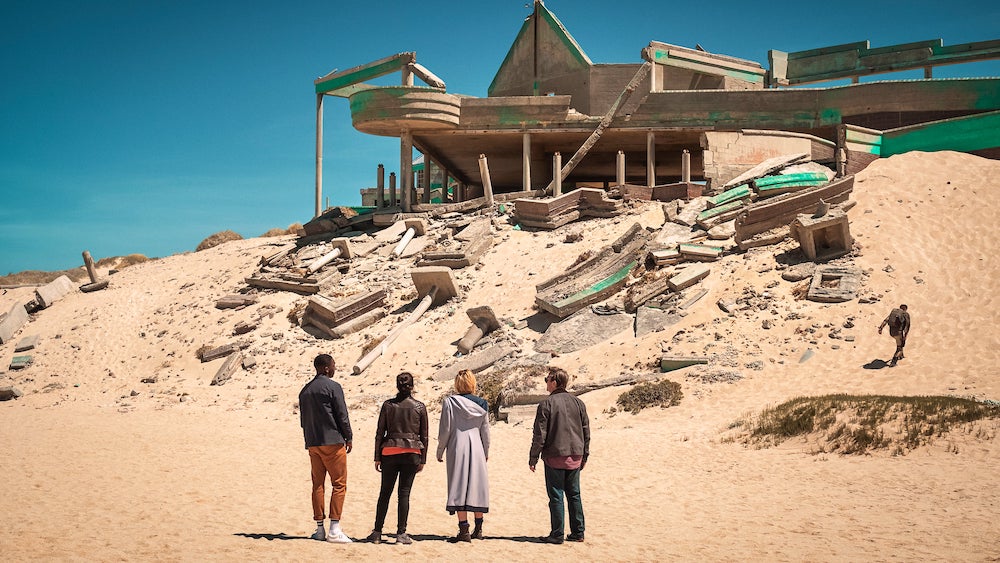
“The Ghost Monument” wasn’t as strong as the premiere. It stranded the new team on a desert planet, getting embroiled in the last leg of a galactic race with only two competitors remaining—with the missing TARDIS just happening to be the finishing line. Filmed in South Africa, this was the first real chance for Series 11 to showcase the uptick in production values, partly due to how stories rarely bit off more than they can chew. Moffat’s era was defined by budget-stretching stories stuffed with multiple locations and storylines, stitched together into elaborate shapes… but Chibnall is more comfortable with a smaller idea done competently. It’s for individuals to decide what style they prefer: ambitiousness that challenges the production team to the breaking point (risking they don’t always stick the landing), or something more achievable that’s done well enough and has fewer seams?
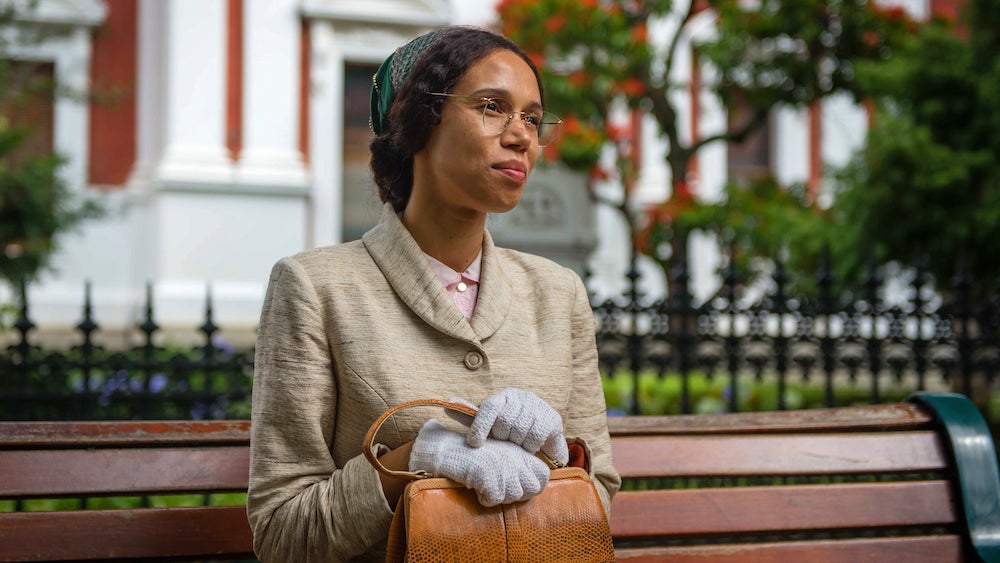
The third episode is perhaps when people started to see just how much Doctor Who was changing in Chibnall’s hands. “Rosa” was another of the historical adventures the show regularly indulges in, but it was markedly different because of its subject matter and approach. Who usually ventures into the past to poke fun at a famous figure’s iconography (i.e. William Shakespeare in “The Shakespeare Code”), or to imbue events from the past with an alternate history (i.e. Winston Churchill and the khaki Daleks), but “Rosa” was markedly different. Co-written by Malorie Blackman and Chibnall himself, it tackled racism in 1950s Alabama by focusing on Rosa Parks (Vinette Robinson) and her famous decision to not relinquish her seat on a segregated bus. That’s heavy stuff for Who, despite the leavening subplot about a racist time-traveller attempting to ensure Rosa never takes her seat to begin with.
“Rosa” was an honourable drama about an important social event in history, which I hope encouraged discussion in households around the world, but tonally it was at odds with anything nu-Who’s done and gave a lot of viewers whiplash. “Vincent and The Doctor” was its closest relation, being another ‘celebrity historical’ tackling a serious subject (mental health), but that Richard Curtis-penned story worked much better. It felt like an episode of Who through and through, whereas “Rosa” was more like an episode of Quantum Leap or Sapphire & Steele with a few Who-y traits.
It was perhaps a mistake to schedule it so early in the run, too, as it gave the impression Series 11 was less concerned about effervescent family-friendly larks and more determined to educate. Good sci-fi teaches kids strong moral values surreptitiously, or risks boring them. The Daleks are catalysts to discussions about racism and fascism, giving children a bedrock of understanding about such complex issues years before Nazi Germany enters their minds, whereas “Rosa” was more like a straightforward docu-drama.
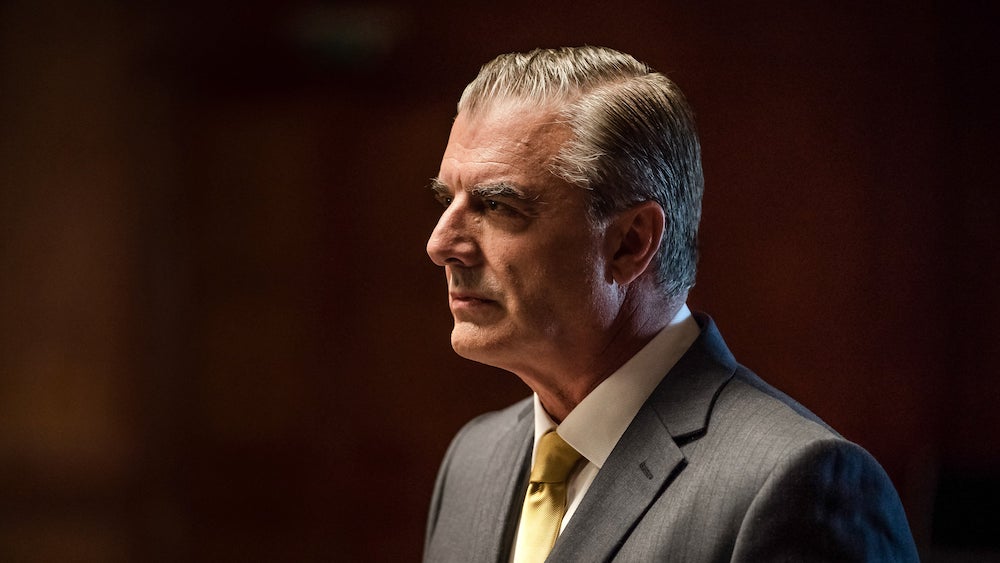
“Arachnids in the UK” was up next, but, despite the comical title, it was a surprisingly lightweight adventure that didn’t seize the opportunities of its own hackneyed concept. It also returned us to Sheffield, nominally to help us understand Yaz better by introducing her family during an outbreak of giant spiders. Unfortunately, Yaz’s home life didn’t give us much insight into her as a person, it only confirmed her obvious Muslin heritage against some family stereotypes. Worse, the big spiders (while excellently rendered VFX) never did anything memorable—beyond one bathtub attack—and the action was disappointingly limited to an empty hotel undergoing renovation. No spiders chasing cars, or scaling tall buildings, or even catching people in giant webs. The B Movie fun promised by the title wasn’t seized upon, with a story involving a cartoonish Donald Trump-style villain (played by Chris Noth) and a cliched explanation of “toxic waste” being responsible for everything. This was a resolutely average tale.
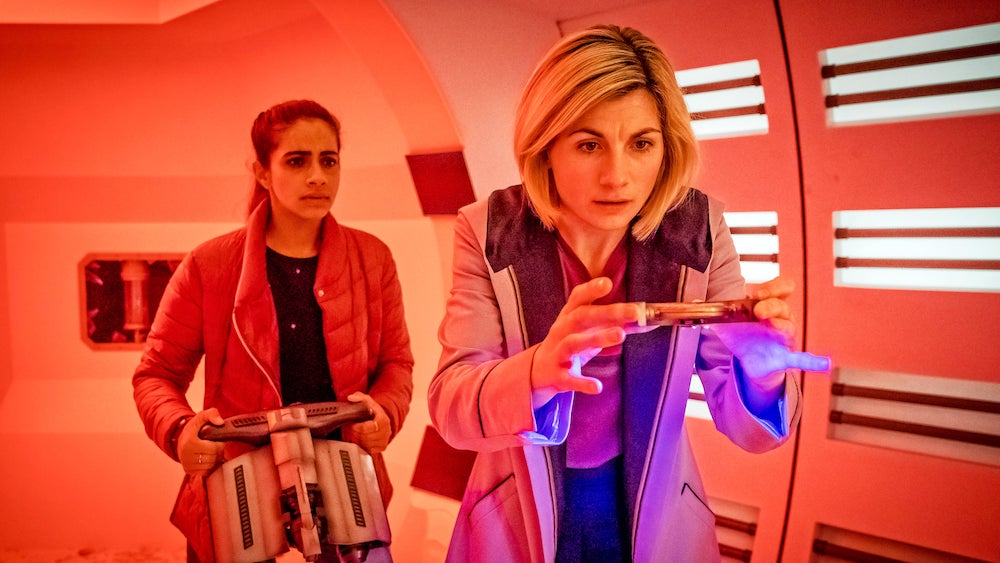
The episode most of us can agree on is “The Tsuranga Conundrum“, but unfortunately for negative reasons. This was a traditional ‘base under siege’ story, with the gang transported to a medical spaceship that’s been invaded by a dangerous critter known as a Pting. A typically halfbaked Chibnall screenplay, this one made a number of fatal errors—from killing the best guest star too early, to giving the companions little to do (beyond hold the hand of a pregnant man in labour). But the biggest creative misstep was subverting expectations by making the Pting cute instead of threatening. Any early tension was sucked away the moment you saw it, along with any chance of being scared by the situation going forward. It was also a very talky hour, with too much dialogue and not enough set-pieces, which went towards it feeling like mid-series filler.
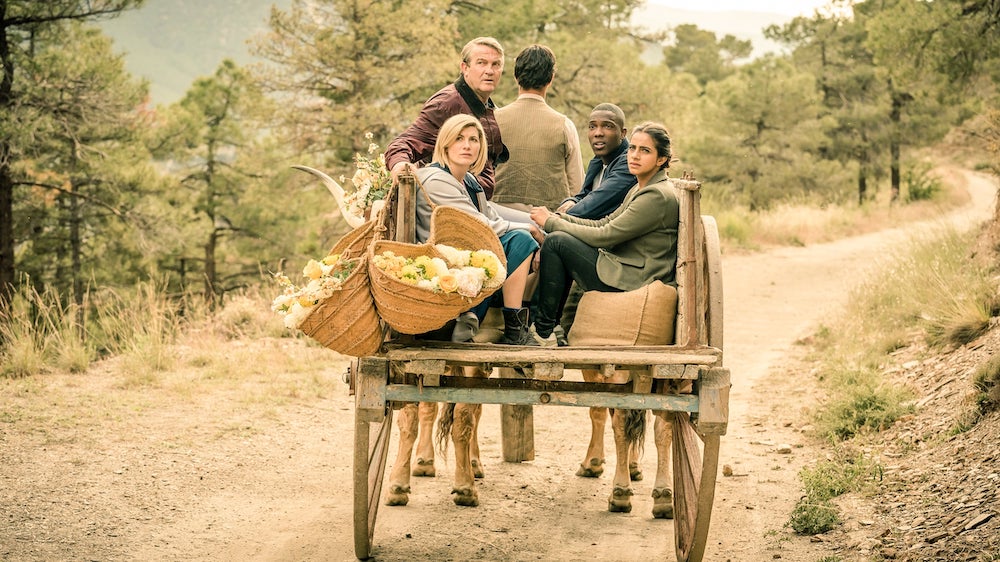
Considering the issues with the well-meaning “Rosa”, it was strange to get what felt like a companion piece just a few weeks later. This time, playwright Vinay Patel crafted a story that ostensibly gave Yaz further context, as she travelled back in time to 1947 during the Partition of India. It was another story that tackled a real-life problem in a factual manner, although it worked slightly better than “Rosa” because it at least remembered it’s a Doctor Who story and threw in some aliens. It’s just a shame the alien’s m.o was suspiciously similar to the Testament creatures that headlined Capaldi’s finale, only five adventures ago.
My issues with “Demons of the Punjab” were again down to its tone and intent, as it wasn’t a particularly fun instalment. And there wasn’t even a clear emphasis on Yaz—whose family history and timeline was literally at stake. By the end, did we learn anything about Yaz as a character we could take forward with us? Not really. We actually learned more about her grandmother as a younger woman, who’s a minor character we never saw again. What was achieved is bringing a little-known historical event to wider attention, certainly for non-British and Indian fans, but I have my doubts kids were talking about this in the playground the next morning.
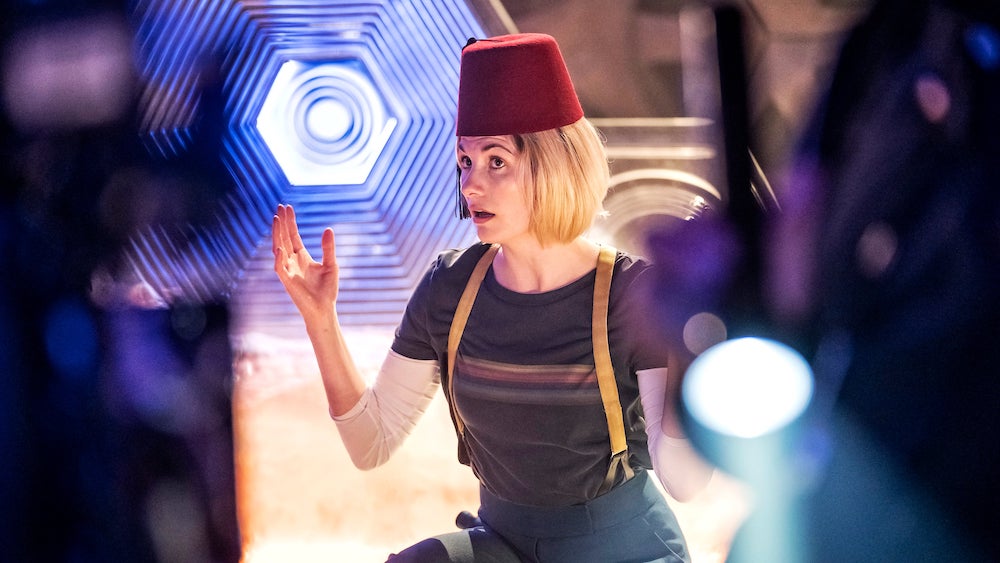
“Kerblam!” has its detractors but, for me, this was one of the few episodes that felt like a Doctor Who adventure—albeit one from a decade ago. Peter McTighe is clearly a fan and assembled a familiar cocktail of knockabout adventure with a dose of social commentary, as the team arrived in a warehouse for a delivery company that’s essentially an intergalactic Amazon. There were expressionless “robot postmen” and things to say about employee rights and the threat of automation, all wrapped in a mystery that was explained quite logically. Things got rushed towards the end, but the story always entertained and gave everyone every companion worthwhile to do, which was appreciated in a series often hamstrung by having to provide material for four regulars and the guest stars.
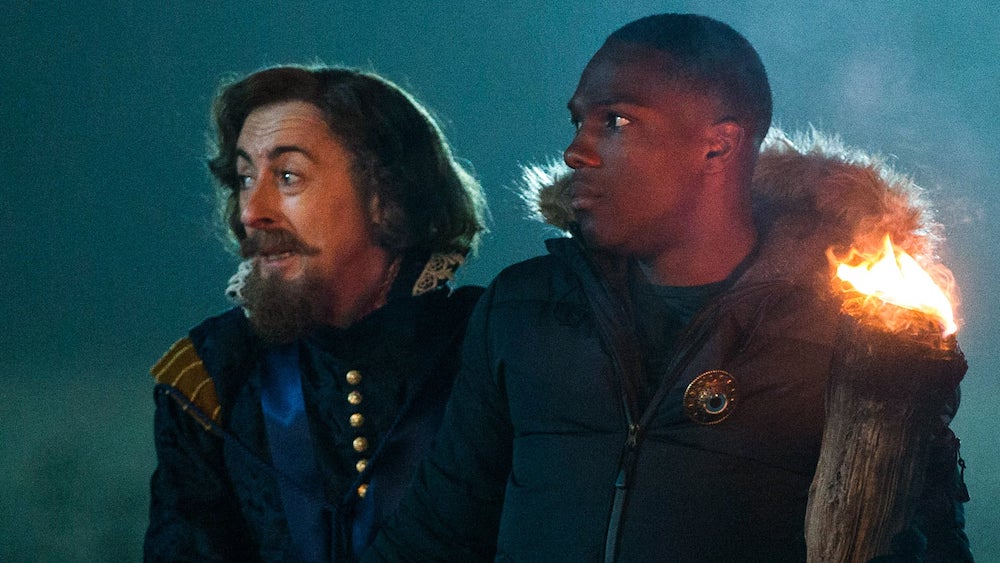
I didn’t expect “The Witchfinders” to split opinion as much as it did, because it was likewise a more familiar Who adventure one could imagine David Tennant starring in. I think the problems with it are down to the abrupt tonal shifts, as guest star Alan Cumming (playing King James) had a camp twinkle in his eye that would suddenly turn sombre, as the story is essentially about the terrible murder of innocent women convicted of being witches due to superstitions prevalent in the 17th-century. But The Doctor was at least more proactive than we’d seen her before, and there was strong support from Downton Abbey’s Siobhan Finneran as a tyrannical landowner who believes in the occult. It’s just a shame the production looked slightly cheap, with spotless National Trust manor house interiors and an unshakeable feeling this was shot one weekend in a local forest—never evoking a sense we’d truly stepped back in time. Still, it was nice to have proper “mud zombie” aliens and for them to be soundly defeated rather than escape unscathed.
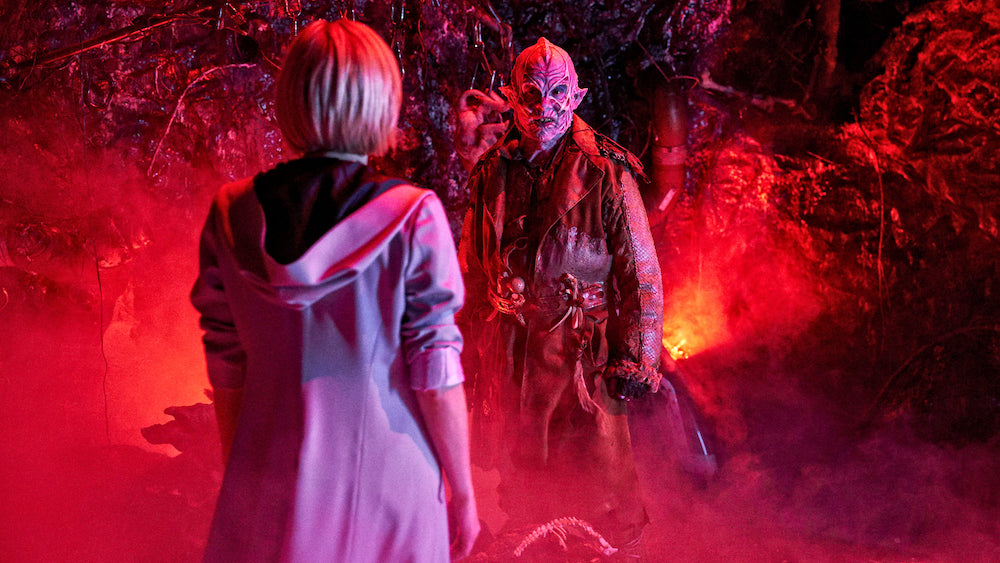
Worryingly late in the series, we finally got a pure sci-fi adventure with some big ideas on its mind in “It Takes You Away“. What began as a modern Nordic fairy tale about a blind girl left alone in a cottage following her father’s disappearance, presumably eaten by an unseen monster in the woods, shifted unexpectedly into a Big Idea about a “conscious universe” accessible through a mirror portal. It was great seeing The Doctor take more of a leading role in the plot, guiding her companions through a dangerous “Antizone” filled with flesh-eating moths, but the story was a convoluted mish-mash and falls apart in retrospect (mainly when considering the logic of the setup with the monster, blind girl, and what exactly her dad was thinking). Still, it was unpredictable and more ambitious than anything else this year, and its attempts to tug at your heartstrings may work better for others. For me, it was Series 11’s best idea on paper, but the execution was lacking.
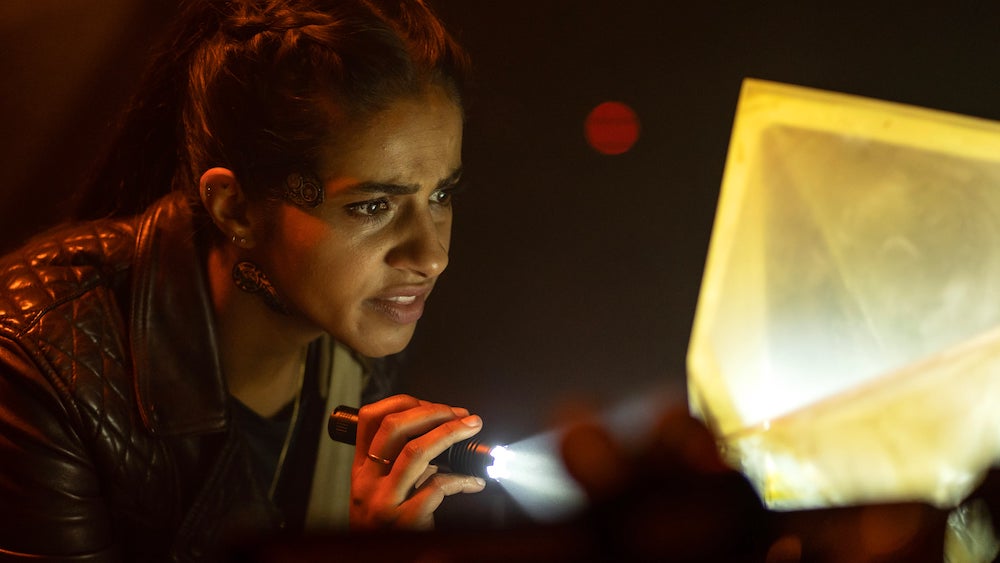
The finale, “The Battle of Ranskoor Av Kolos“, wasn’t highly anticipated because Series 11 put no effort into breadcrumbing a mystery to lead us there. If Chibnall devised this revamp of Doctor Who by looking to the show’s past for inspiration, it was a mistake to ignore how modern TV shows have evolved in the age of Netflix. Consequently, this felt like the show simply petered out with an uninspired decision to bookend the premiere with the return of tooth-studded villain “Tim Shaw”—remember him?—in what amounted to a belated sequel nobody really wanted. The usual positives were intact: luscious production values and good character work in places, but the story was a mess that didn’t hang together, and it even harvested ideas from old episodes like “The Pirate Planet” and “Journey’s End”.
Overall, Series 11 was markedly different to anything since Doctor Who returned 13 years ago… but not very successful. In avoiding so many of the good things we’ve come to expect from the show, it caused some upset by never replacing what we lost with anything fundamentally better.
The most startling omission was an overarching story weaving between every instalment, a device that’s been the linchpin of Who since 2005 because that’s what people need to “hook” them. There wasn’t much of anything that knitted these episodes together, narratively, so it failed to build a head of steam or stoke deeper interest through the weaker episodes. The loss of a good two-part story was also a terrible shame, not least because that would have helped with the cramped “Team TARDIS” arrangement…
Yes, having four people in the TARDIS lowered the screen time most of them received or resulted in stories that strained to give everyone something worthwhile to do. Chibnall defended his decision by reminding us that Classic Who used trios of companions, but he conveniently forgets those old serials ran for multiple episodes and it was, evidently, a huge benefit to have multiple travellers with The Doctor to flesh out stories.
Yaz was especially poorly served as a character, failing to make an impression most weeks, beyond the occasional scene, which is all the more surprising considering she had two episodes partly-inspired by her character! “Arachnids in the UK” utilised Yaz’s family in the background and gave her mother a sizeable role in events, while “Demons of the Punjab” delves into the Khan family’s Indian heritage. Quite how she ended up being the least interesting or necessary of the three companions is a serious blow to how these episodes were being managed.
Ryan and Graham generally stole the limelight from Yaz—often because they had a family connection between them that created inbuilt drama (with Ryan not entirely won over by his nan’s widow). Bradley Walsh also played a character every writer seemed to grasp better, perhaps due to the average age of Who writers? But it also didn’t help that Cole, and to a lesser extent Gill, are much less talented and natural actors.
After 10 episodes, I couldn’t even tell you what Yaz’s relationship with Ryan is defined as—beyond them being introduced as old friends who drifted apart after school. More should have been made of Yaz’s social status as a police officer, too. In some ways, all three felt like characters who served their purposes by the end of “The Woman Who Fell to Earth”… as they weren’t built to last. Well, except for Graham, who was a very unexpected highlight and arguably a more likeable and reassuring presence than The Doctor sometimes.
A common criticism of Series 11 is that Doctor Who became “too politically correct”. It’s a remark that always gets people’s backs up or creates a wave of confusion. Mandip Gill herself was quoted as being confused as to how “too” and “correct” can exist in the same sentence, which seems like a fair point. It’s very counterintuitive. After all, a politically correct person believes that language and actions that might cause offence to others should always be avoided. That sounds reasonable. We should all take a moment to consider how we’re coming across. The problem is that being “PC” can become a straightjacket to art and freedom of expression because it puts things in a neat box and doesn’t allow artists to explore how people and the world truly are.
In making Doctor Who “too PC” this year, most reasonable people are simply noticing the show isn’t taking risks and seems afraid to do anything that might upset the masses. Now, Who is a family show watched by young children, so nobody expects it to have a racist companion and drop them into the episode “Rosa”, no matter how fascinating that might be! But people do like to see their comfort zones stretched, or for things to be morally greyer. Why? Well, because it means the story is presenting a challenge for the viewer, or the writer is communicating a perspective that has a few kinks in its tail the story can explore both sides of.
I just wanted to mention this because the complaint “it’s too PC” has been so prevalent, and it does seem that Chibnall front-loaded Series 11 with stories and characters that erred on the side of caution in terms of how they might be received. I mean, wouldn’t it have been interested if Chris Noth’s Trumpian hotelier in “Arachnids in the UK” had been painted as a thoroughly awful human being… then saved everyone from the giant spiders at the end by sacrificing himself? And why is the first female Doctor so stereotypically “feminine” in her personality traits? Wouldn’t it be more interesting if she was short-tempered, or emotionally awkward?
I know we did that quite recently with Capaldi’s Doctor, during Series 8 particularly, but the only noticeable subversion of what one might expect from “a female Doctor” is how Thirteen’s good at engineering and built her own sonic screwdriver. Unfortunately, her hands-on pragmatism wasn’t something that recurred very often after the premiere and it rarely saved the day – with later episodes again relying on the overuse of her favourite multi-purpose tool.
Jodie Whittaker accepted a challenge in taking on this iconic TV role, but none of my issues with her stem from her gender. I’ll be honest and say my preference would have been to keep The Doctor as a man, but giving little girls a hero they can more easily identify with and emulate is hard to begrudge, and it does open up fresh storytelling possibilities.
However, Series 11 was mindful about even mentioning The Doctor’s gender-switch, likely because Chibnall didn’t want to make a big deal over it. I think that was wise, all things considered. The Doctor is The Doctor. And a more enlightened being than silly humans. But some of the funnier moments were when Thirteen referenced her sex change, and there was an added element of difficulty and drama in “The Witchfinders” when King James wouldn’t accept The Doctor’s authority and chose to believe she was a practitioner of the dark arts. It would have become laborious to keep mentioning how The Doctor is now a woman (particularly amidst characters who never knew her as a man), but perhaps it was brushed under a carpet a little too much. If you have a big differentiating aspect of the character, why not use it from time to time?
Regardless of gender politics, Whittaker’s own conception of The Doctor didn’t seem to generate much enthusiasm. It was troublesome having so many travellers in the TARDIS, with four faces jostling for screen time, but it was worrying how often The Doctor blended in amongst her own companions this year. You shouldn’t be able to take your eyes off The Doctor, as she’s the hero and star of the show, but Chibnall wanted to encourage a more ensemble feel… and this led to a diminished sense of The Doctor’s authority and leadership throughout many of the stories. She became a kooky woman with a useful time machine and eccentric fashion sense, prone to exposition dumps in-between flamboyantly pointing a high-tech screwdriver at everything.
Whittaker wasn’t a big fan of Doctor Who (not saying she disliked it), but Chibnall clearly saw qualities of the famous Time Lord in her on-set behaviour while making Broadchurch. I can see some of that in the behind-the-scenes footage about the making of the show: she’s quirky, fun-loving, good-natured, and a talented actress. She definitely approached the role with the intentions of making The Doctor likeable, clever, childish, and filled with a sense of wonderment and a desire to help people. Those are certainly elements of The Doctor’s personality one needs in their arsenal, but Whittaker was missing things that make the character interesting and dramatic: an “alien” quality to her perspective on humanity (beyond social awkwardness), a sense that she’s an ancient being who’s seen terrible and amazing things (beyond name-dropping historical figures and mentioning nonsensical events), a slightly superior attitude that needs tempering by her companions, and a sense of innate authority that was sorely lacking in most of her interactions.
The Doctor should always have an element of danger, and thus the ability to strike fear into the hearts of her enemies – but Thirteen doesn’t have that in her toolbox… yet? The only scene that came close, intentionally so, was her big speech to the Stenza warrior in her debut, but I don’t think anyone got chills hearing it. Maybe Whittaker’s doomed to feel a bit lightweight in this role, sadly, but I’m hoping some good writing and direction can see her elevate the material she’s given soon.
Quite a few earlier Doctors didn’t arrive fully-formed, often undergoing useful tinkering based on audience feedback—from sardonic Colin Baker softening his acid tongue, clownish Sylvester McCoy’s gaining a Machiavellian intellect, and even grouchy Peter Capaldi becoming more of an ageing rocker uncle. But considering how quickly people warmed to Christopher Eccleston (some say even with his first line, “run”), David Tennant (in his debut, standing up to the Sycorax), and Matt Smith (also in his debt, giving a speech to an ‘eyeball ship’ on a rooftop), going this many episodes without delivering a rousing moment of certainty that Thirteen is The Doctor is unfortunate.
Maybe it’s Whittaker’s choices with her performance being pitched somewhere between inquisitive child and know-all big sister, the scripts not giving her enough good moments to get stuck into, or perhaps it’s the subconscious baggage some viewers have about seeing The Doctor as a male hero… who knows. But something didn’t click for me, and many others. I sometimes only saw The Doctor as an exposition-spouting companion who called dibs on the blue time machine and magic screwdriver; lacking a backbone and any trace of a darker edge. Much like this strange and disappointing series.
Hearing different stories about https://ativanshop.com I’ve been afraid of taking it. So I started taking it 0.5 mg daily. And for the first attack, it worked really good, guys!
